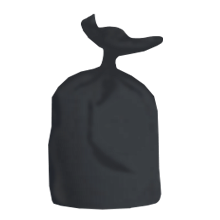Home Composting is the most environmentally friendly way of dealing with kitchen and garden waste. We have spoken to islanders, schools and groups who are passionate about composting and the benefits it brings.
Dee Sangan, Jamblin Flower Farm
Lifelong learning through composting
- The basics of composting are simple - but it's also fascinating to explore different techniques and the science behind the process.
- For Dee Sangan and her family, the learning experience with composting is lifelong and they enjoy experimenting with new methods when time allows.
- "The basics are easy, and with a toddler in tow, basic is a fair assessment of how we currently compost!" said Dee.
- "But if you love learning the science behind things, you can delve deep into the rabbit hole of how complex and fascinating the composting process is and really experiment with your processes at home - wormeries, windrows and bokashi composting to name just a few."
- Dee's family compost food waste (tea bags (once checked for any plastic content) peelings, egg shells and more), green waste as (flower trimmings, grass cuttings) and brown waste (shredded cardboard, untreated wood shavings and leaves) to get the right mix.
- The result is a soil packed full of nutrients which is great for the garden and substantially reduces the waste that her household produces.
- With a little one in tow, it's also a fantastic way to instil a love for nature in children.
- "Provided you have the space to do so it's a great way of getting the most out of your food and garden waste, benefiting your garden ecosystem and your soil," said Dee.
- "It's also a wonderful learning opportunity for children, it's easy to ignite a bit of a passion for learning about science and biodiversity whilst digging for or "feeding" the worms."
Elizabeth College
College carpenter brings student's design to life
- After searching online for a compost tumbler, then-Year 11 student Amelie Le Prevost decided to design her own.
- Having completed her plans as part of her Design Technology GCSE at Ladies College, Amelie presented the idea to her new teachers at the Elizabeth College Sixth Form.
- Now in Year 12 and soon-to-be the College Eco Prefect, Amelie has seen her idea brought to life by the College's carpenter.
- "We'll be putting food and green waste in it and the compost will ferment inside the tumbler," Amelie explained.
- "It is designed so that the compost jolts rather than slides, so the compost is turned regularly."
- Teacher Brian Aplin said it was a great example of staff and students learning from each other.
- "Amelie joined us and we have learned from her as well. We were discussing this one day [in the Eco Club] and she mentioned that she had designed one of these and there was this lightbulb moment."
- The College wants to cultivate positive habits in youngsters through its Eco Club and first took out an allotment at the Edible Guernsey site three years ago.
- "It is part of the curriculum now, all of our year 9 students will work on the allotment for five weeks on a Friday afternoon," said Eco Team Leader Sharka Lee.
- "We try to help the children to gain an understanding of the process that takes their food to the table and also to get a hands-on connection with nature. You don't get that from a textbook, it isn't the same experience that you get from actually doing it.
- The Eco Club collects peelings daily from the school cafeteria to use in the allotment. It is part of a wider objective to reuse and recycle wherever possible.
- Mr Aplin explained: "We re-use things from the school so they don't get thrown in a skip. It is about education and practical skills. We want to give the students an insight into what they can do when they are older, and the allotment is one just one bit of that. If you're taking home a bag of potatoes every Friday, you don't need to buy them."
Ladies' College
Composting worms giving Ladies' College pupils food for thought
- An ongoing composting study at The Ladies' College is transforming canteen waste into a nutrient-rich food for plants.
- The whole cycle that brings food to our plates is being studied by pupils - and they are already successfully reducing kilos of food waste every month through composting.
- From Melrose through to the Sixth Form, the College is investigating and aiming to develop solutions for real life problems.
- Whether the challenge is food waste, pesticide use, pollution or even sour fig, the College's Head of Science Dr Karen Marshall said all their research is united by a common objective.
- "These are real world projects that solve real world problems using proper scientific methods," she said.
- "With the food waste, it's a cycle. To do something with the food waste you've got to have somewhere to compost it. Then you need to compost properly and plant something. Once you've used what you want, you can put the scraps back in the compost."
- "It's important that the girls understand the whole cycle, why they are doing it and how it all fits together."
- A group of Year 9 pupils has been collecting and analysing data around the College's food waste this school year, supported by the kitchen staff, who separate cooked food waste and 'pre-plate' scraps and peelings so that these can be composted.
- The College produces around 15-20 kilos of food waste per month, however this has been significantly reduced by the composting bins and wormeries the College installed in September.
- In addition, it has improved understanding around food waste and portion sizes.
- "The amount of food waste is quite shocking," said Year 9 pupil Holly. "When you are in the Core eating, you don't realise how much it all adds up to."
- A Year 10 group has focused its efforts on the science behind composting - investigating how to produce nutrient-rich soil through the right mix of ingredients and how different conditions affect this.
- "We have been taking lots of different samples from the compost at the school to figure out how the different foods impact the mineral levels in the soil," explained Year 10 pupil Imogen.
- "We tested how cress grew in different conditions and the importance of getting enough air in so there is anaerobic heat, but also making sure there isn't too much moisture, so that it doesn't rot."
- The wormeries in particular have become a popular feature at the College and are regularly shown to visitors.
- In keeping with the sustainable themes of their studies, the wormeries are constructed by repurposing old car tyres and other leftover material from Design Technology, while the surplus food produced from the garden will be donated to the Mill Street Community Café.
- Year 10 pupil Eva said working in the garden had other benefits as well.
- "It's very relaxing and therapeutic to spend time out here and see the compost develop," she said.
- Does your school compost? Get in touch with us to share your story or to learn more about the many benefits of composting.
Madeleine Norman
"I rarely put out a food waste bag"
- Madeleine Norman's family has been composting for as long as she can remember.
- After moving to a semi-detached property in Town with an artificial lawn, Madeleine wondered whether she would be able to keep up that tradition.
- Having sown plants around the borders and brought some plant life into her new garden, Madeleine decided to install a compost bin on her patio 18 months ago and has been delighted with the results.
- "I've been composting for a number of years and my family always had a compost heap, so it was an obvious thing for me to continue when I got my own place," she said.
- "I love that I rarely need to put out a food waste bag as almost everything can go in my compost bin. It's very satisfying to see that the bin isn't full after 18 months, so stuff is clearly breaking down.
- "It's exciting to see how the insects have been attracted to it. It doesn't smell at all and I have had no rats or other pests, which I know worries some people."
- The usual ingredients in Madeleine's composting bin include fruit and vegetable peelings, eggshells, cat fur, tea leaves, garden weeds and clippings, and a bit of cardboard such as egg boxes.
- Madeleine turns the compost regularly and tends to the soil.
- "I try to give it a mix with a fork every now and then, some water if it looks dry, and occasionally I'll pour in some compost accelerator since this one is still quite new."
Sasha Marsh, Soil Farm
Healthy food starts with healthy soil
- Locally-produced, nutrient-filled food just hits different and the Soil Farm strongly believes that healthy food starts with healthy soil.
- The project, which was founded by Sasha Marsh and Jock Pettit in 2019, promotes the benefits of biodiverse compost and growing food locally.
- The Soil Farm's market garden produces an abundance of fruit, vegetables and herbs to fill their popular subscription boxes and hedge veg stalls.
- "Our focus is producing soil packed full of microbes and getting the soil to feed the plants with minerals and nutrients," said Sasha.
- "We focus a lot on the diversity of nutrients we are putting into our compost. We are very careful about our sourcing to make sure we are creating the right habitat for the soil microbes to survive and thrive."
- She says the very best food sources to put into compost are 'pre-plate' foods, such as vegetable peelings straight from the chopping board.
- Sasha encouraged people to try out home composting for themselves. If you've never grown your own food before, she suggested starting small and building confidence.
- "It doesn't matter if you fail at first. Keep trying and focus on getting really good at one thing. If you find that you're producing more than you need, you can swap some with friends and you'll get more from it."
- She is in no doubt that healthy, living soil is the place to start - whether that's through composting, a wormery or another method.
- "Our main focus is the food we produce, but to create that food, the compost we produce is so important."
- Whether you are new to composting or just looking for new inspiration, the Soil Farm delivers a popular 'Farmer Gym' experience on Saturdays and is planning several composting workshops in the coming months, so check out their social media channels if you're interested in finding out more!


















